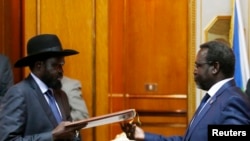JUBA —
South Sudanese President Salva Kiir has said elections scheduled for next year will have to be delayed to give South Sudanese time to reconcile after months of fighting that has killed thousands and displaced more than 1.2 million.
"Elections will not be held in 2015 because reconciliation between the people will have to take time," Kiir told reporters at Juba airport on Sunday after returning from Addis Ababa, where he met with his arch-rival in South Sudan's conflict, former vice president Riek Machar, for the first time since fighting erupted in December.
During the reconciliation process, South Sudan will have an interim government, Kiir said.
Kiir and Machar signed a framework agreement in Addis Ababa late Friday, agreeing to lay down arms and discuss the formation of an interim government, among other issues, in a bid to restore peace in South Sudan after months of fighting.
But hours after the agreement was signed, Kiir said opposition forces violated the ceasefire, launching attacks in Unity and Upper Nile states.
Opposition military spokesman Lul Ruai Koang denied the allegations, laying the blame for the violation of the ceasefire agreement at the feet of government forces.
“As we speak, they are inside Bentiu town and they are shelling our positions, as well as civilian populations ..." Koang said.
The opposition spokesman also charged that government forces had targeted camps of internally displaced persons.
"There is serious fighting and a lot of shelling by the government troops, because they entered and they have taken our positions,” he said.
Reports indicate fighting was still ongoing in parts of South Sudan Monday. But Defense Minister Kuol Manyang Juk said he has not received any reports of fighting anywhere in the country, which is six days into a "month of tranquility."
During the month-long truce, both sides have pledged to lay down arms to allow farmers to plant crops and relief aid to get through to more than one million displaced people.
Without a ceasefire, aid agencies have warned that parts of South Sudan will face famine because there will be no crops to harvest if farmers cannot plant now.
Ethiopian Prime Minister Hailemariam Desalegn last week invited Kiir and Machar to Addis Ababa to hold face-to-face talks as the international community stepped up pressure on the two sides to end the conflict.
Kiir said he will head back to Addis Ababa in one month for a follow-up meeting with Machar on the peace deal.
At his airport news conference, Kiir joked that Ethiopia's prime minister had threatened Machar and him with imprisonment if they did not sign the framework agreement and agree to take concrete steps toward peace.
But Dina Mufti, a spokesman for the Ethiopian foreign ministry, denied that Desalegn had resorted to strong-arm tactics.
"This is something that has been taken out of context. We don't threaten leaders, we don't threaten our neighboring countries," Mufti told South Sudan in Focus.
"Elections will not be held in 2015 because reconciliation between the people will have to take time," Kiir told reporters at Juba airport on Sunday after returning from Addis Ababa, where he met with his arch-rival in South Sudan's conflict, former vice president Riek Machar, for the first time since fighting erupted in December.
During the reconciliation process, South Sudan will have an interim government, Kiir said.
Kiir and Machar signed a framework agreement in Addis Ababa late Friday, agreeing to lay down arms and discuss the formation of an interim government, among other issues, in a bid to restore peace in South Sudan after months of fighting.
But hours after the agreement was signed, Kiir said opposition forces violated the ceasefire, launching attacks in Unity and Upper Nile states.
Opposition military spokesman Lul Ruai Koang denied the allegations, laying the blame for the violation of the ceasefire agreement at the feet of government forces.
“As we speak, they are inside Bentiu town and they are shelling our positions, as well as civilian populations ..." Koang said.
The opposition spokesman also charged that government forces had targeted camps of internally displaced persons.
"There is serious fighting and a lot of shelling by the government troops, because they entered and they have taken our positions,” he said.
Reports indicate fighting was still ongoing in parts of South Sudan Monday. But Defense Minister Kuol Manyang Juk said he has not received any reports of fighting anywhere in the country, which is six days into a "month of tranquility."
During the month-long truce, both sides have pledged to lay down arms to allow farmers to plant crops and relief aid to get through to more than one million displaced people.
Without a ceasefire, aid agencies have warned that parts of South Sudan will face famine because there will be no crops to harvest if farmers cannot plant now.
Ethiopian Prime Minister Hailemariam Desalegn last week invited Kiir and Machar to Addis Ababa to hold face-to-face talks as the international community stepped up pressure on the two sides to end the conflict.
Kiir said he will head back to Addis Ababa in one month for a follow-up meeting with Machar on the peace deal.
At his airport news conference, Kiir joked that Ethiopia's prime minister had threatened Machar and him with imprisonment if they did not sign the framework agreement and agree to take concrete steps toward peace.
But Dina Mufti, a spokesman for the Ethiopian foreign ministry, denied that Desalegn had resorted to strong-arm tactics.
"This is something that has been taken out of context. We don't threaten leaders, we don't threaten our neighboring countries," Mufti told South Sudan in Focus.





